The beach, there was always the beach. In spite of the hardships in prewar Gaza – undrinkable water, sporadic electricity, crushing unemployment – the glorious Gazan beaches represented a slice of freedom, of softness, of limitless horizons for a people who had lived under tight blockade in a tight space since 2007.
Just before sunrise on Oct. 7, 2023, Nada Thabet Dughmosh, a 24-year-old interior-design student at Al-Aqsa University, did what she almost always did before starting her day: She walked the beach in Gaza City, in the northern part of the Gaza Strip.
As she strolled in the sand, she was thinking about her school projects, her family and building a life in her tortured homeland. “When I heard strong explosions resembling thunder, I honestly thought rain and storms were coming,” she told me in mid-March through WhatsApp. “My belief was wrong when those explosions continued.”
The sounds she heard came from the start of the Hamas attacks on Israel. Hamas fired thousands of primitive rockets from the 41-kilometre-long strip they controlled. At the same time, Hamas militants launched a chaotic incursion into Israel that would kill around 1,200 people, mostly civilians, and take 253 hostages. Hours later, when the Israeli counterattack began, any Gazans’ hopes for a Hamas victory vanished; outright fear set in. “Air strikes began destroying entire apartment buildings near my home,” Nada wrote.
Soon, thousands of Palestinians in Gaza were dying – the death toll now stands at more than 32,000, according to Gazan health officials – and Nada and her seriously wounded father would eventually flee south, to Rafah, on the Egyptian border. I tried to keep in contact with Nada, but with the electricity and internet systems destroyed by the relentless bombing, she went dark. On Instagram on Oct. 15, I asked if she was okay. “No one is ok here,” she responded eight days later.
Then no messages for almost three months. I managed to reach Anas Al-Baba, a Palestinian photographer who I had once hired in Gaza, and who was a friend of Nada’s, whether he had heard anything about her as he tried to save his own family. Nothing, he told me. By Christmas, as the Gazan body count soared and the strip began to resemble Dresden in 1945, I assumed she was dead or seriously injured. On Jan. 24, she surfaced, announcing to me: “I am fine … the situation is difficult, bad.”
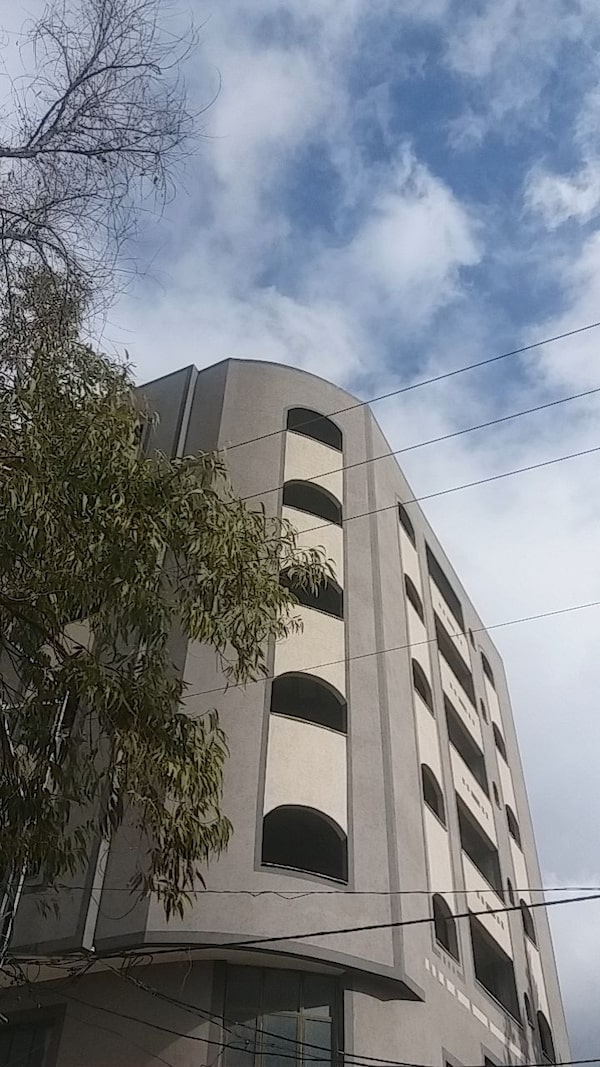
Nada’s apartment building in Gaza City before it was destroyed in 2023.Supplied
Her diabetic father, Thabet Youssef Dughmosh, 63, was wounded, and there was almost no medical care. Israel had attacked the hospitals in its hunt for Hamas fighters and their “terror” tunnels, and medical supplies were virtually non-existent. She sent me a gruesome photo of her father’s right leg, the flesh peeled back around the ankle, exposing the fractured bone, the skin around it a sickly yellow-green. She begged me for help to get him to a hospital in Egypt. “His leg is gonna be cut if we do not do the operation in one week,” she told me – “cut” meaning amputated.
I wanted to save Nada and her father. I had no idea how.
Nada and I met face-to-face for the first and only time in June, 2022, in Gaza City. I had been in Israel reporting on the Russian Jews, a few of them oligarchs, who had fled to Israel after Russian President Vladimir Putin launched a full-scale invasion of Ukraine. I made a diversion to Gaza for three days to write about the 15th anniversary of the almost impenetrable land, sea and air blockade that had turned the densely populated strip into an “open air prison,” in the view of many human rights and aid groups – and every Palestinian.
My idea was to talk to the teenagers and young adults who had spent most or all of their lives under blockade, and how they were getting on with their lives. Some of their stories left me in tears, like that of the young woman who had been buried alive in rubble after an Israeli air strike in 2021. When she was unearthed 12 hours later, she learned that 22 members of her family had died in the attack. Other stories filled me with hope, even laughter. My favourite was the one about the Palestine Sailing and Rowing Federation, whose first members used old refrigerator doors as surfboards because the Israelis would not allow them to import real boards.
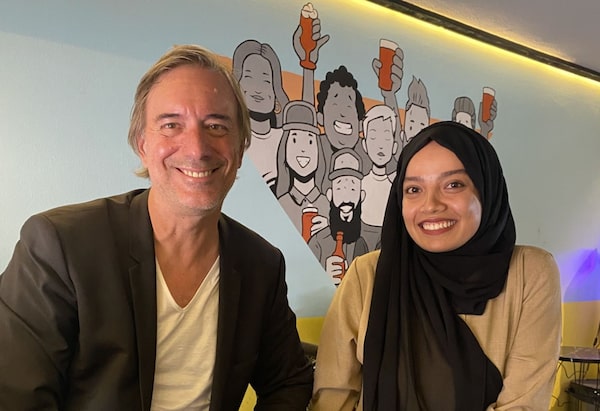
Eric Reguly with Nada at a cafe in Gaza City in 2022 when they first met.Supplied
The photographer Anas and I had met Nada in a buzzy café in Gaza City. She was tall, well-dressed, had a dazzling smile and seemed full of optimism in spite of her scant career options in a desperately poor territory. “The Israelis are trying to shock us, but they forgot one thing,” she said. “They forgot that we are free spirits and own this land.”
She pumped me full of questions about my life in Rome, where I am based for The Globe and Mail. She had never left Gaza and had little concept of the aspects of life that Westerners take for granted, from freedom of movement and elections to potable water and not relying on UN food handouts for nutrition. (UNRWA, the UN’s Palestinian refugee agency, was Gaza’s biggest employer and fed almost half of Gaza’s 2.3-million population before the war.)
We agreed to stay in touch and that, once back in Rome, I would use Zoom to give her the occasional English lesson. We became friends and I fantasized about writing my next book on Gazan youth, whom I found to be kind, generous and enthusiastic.
They were convinced they would one day live in a free, sovereign country even if they knew that Israeli Prime Minister Benjamin Netanyahu would oppose the two-state solution – supported by the United States, Canada, the European Union, China and many other countries – to his dying breath. They hoped Mr. Netanyahu might be replaced with an empathetic leader.
Many of the Gazans I talked to thought that Hamas was corrupt, authoritarian and could not be trusted. A few considered them freedom fighters and said that armed resistance to the occupation was justified. Nada was one of them: “What you call Hamas, we call resistance. These are people like us who have lost their lives, their families, their homes and their money. They fought against the idea of the big prison we were in. Do you and your friends understand me?”
Nada and her family lived a fairly prosperous life in Gaza, as far as I could tell from my visit and our video calls. They lived in a modern apartment with a garden, a rare bit of green in the concrete cauldron of Gaza City. Photos of Nada’s cheery, bright bedroom showed houseplants, an Apple computer and shelves crammed with books.
Her father studied medicine in Germany but worked in agriculture when he returned. Nada’s mother, Basma Saad Bakr, 57, was a homemaker. Like many Palestinian families, there was a gaggle of kids. One of Nada’s sisters lived in Ankara, another in Milan. The third sister and two brothers were still in the family home. Two other brothers and their families lived in other apartments in the same building.
The Israeli bombing of northern Gaza on the night of Oct. 7 and beyond saw Nada and her family huddled in the middle of their apartment, well away from window glass that a bomb concussion could turn into lethal shrapnel. “We never slept,” she said. “We agreed as a family to either die together or live together, so no one would suffer the loss alone … That is why we did not leave our house for the southern part of the strip, where the Israelis claimed it was safe.”
Nada’s messages to me were heart-rending, visceral, graphic. Here are her memories (edited only for length) about the first days under attack:
“Days and nights passed, and beautiful Gaza began to disappear. They destroyed my university. They destroyed every street I walked on, every historical, religious or cultural site. Their goal was to erase the landmarks of Gaza, to erase everything that indicated its existence. I think it is farfetched, almost impossible, to finish what I have been working on for the past few years of my life. They took away my hope of ever living a normal life again and believe me, I will not forgive.”
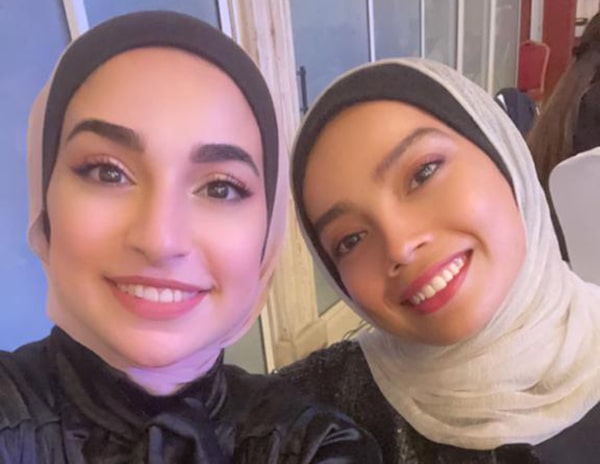
Nada, right, and her best friend Nesreen Nasr Jarada. 29, who was killed with her family on Oct. 25 in Gaza city.Supplied
Given the destruction of Gaza City, it was a miracle that Nada and her family survived the aerial attacks and the ground invasion by the Israel Defence Forces (IDF). There were daily tragedies. On Oct. 25, Nada lost her dearest friend and her family only five minutes after their last phone call.
“Nesreen [Nasr Jarada] was my best friend, only 29! She was getting ready to defend her master’s thesis in psychology and preparing for her wedding in December. [We would] call every day, to reassure each other that we’re still alive. It has been over 140 days since I lost Nesreen, and every day I recall memories with her and cry a lot, cursing the occupation a million times for her sake. Nesreen and her family weren’t the only ones we lost in this war. We lost entire families. We lost friends, colleagues, and teachers. They destroyed places, dreams, and many lives.”
The most terrifying night came on Dec. 18, when their neighbours’ apartment building, with 40 residents, was destroyed. Nada and her family were celebrating their mother’s birthday at the time.
“We heard children calling for help from under the rubble. We knew that the airplanes were still above us, and we knew that rescuing any soul among these would cost us our lives. Frankly, we didn’t care. We tried our best, and our fear turned into strength, and we started rescuing them. Unfortunately, we could only save 22 people. What are the chances of saving someone who was crushed by a five-storey building? That night, we provided first aid to those people, most of whom were children, their bodies trembling with fear. Every time we dozed off, we woke up to the sounds of people calling for help, and we couldn’t save them. We saw scattered remains in our alley. I saw someone’s foot, another person’s hand, and a woman’s hair. Things you can’t see even in a horror movie.”
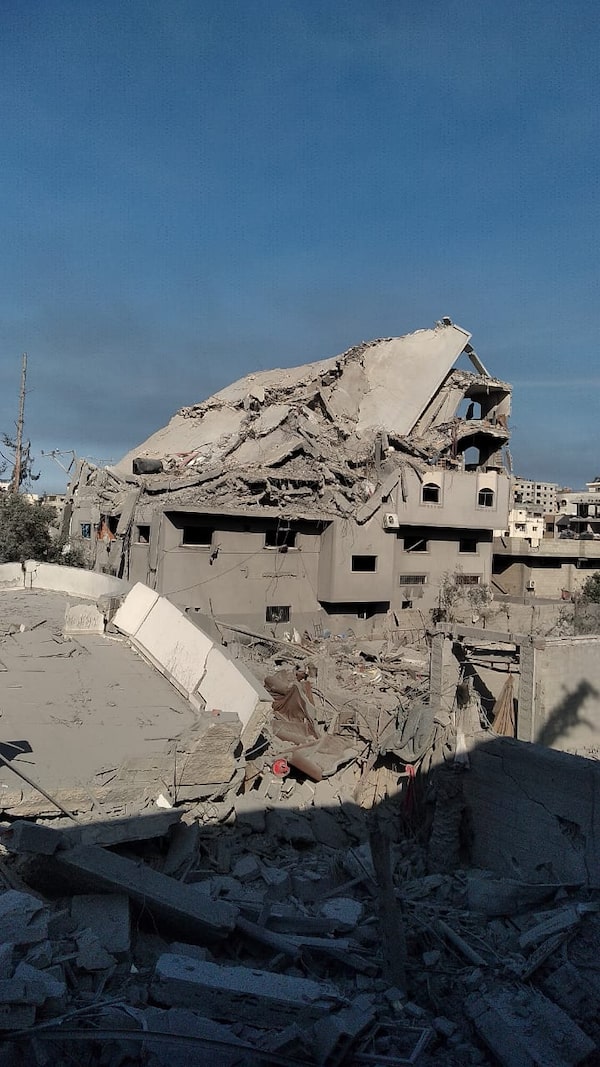
Nada’s home was destroyed in Gaza City after an Israeli air strike on the night of Dec. 18th.Supplied
Nada’s father was wounded by rocket shrapnel the next day, Dec. 19 – the same day the upper floors of his family’s apartment building were destroyed, and he was in extreme pain. With no intact medical care available near them – the doctors in the besieged Al-Shifa hospital in Gaza City could do little for him and said his leg might have to be amputated – she knew she had to get him into an Egyptian hospital. Nada sent me a desperate message asking for help. All I could think was to ask Maha Reda, a Cairo journalist who works as my interpreter and “fixer” when I am in Egypt, to see if she could get Thabet’s name registered on the emergency medical list at the Egyptian Ministry of Foreign Affairs.
On Jan. 28, equipped with copies of Nada’s and her father’s identity documents, Maha did just that. It worked, or at least we think it helped. Nada has a somewhat different story, describing to me how it was “impossible” to get out without paying the travel agency working with the Egyptian authorities US$5,000 a head to secure an exit permit from Gaza. “If you did not have that amount, you were worthless and you would definitely die,” she said.
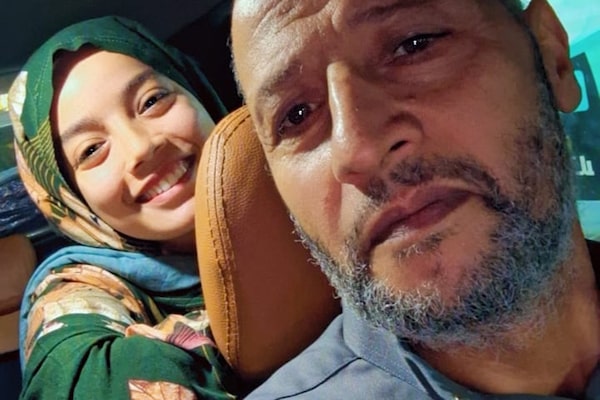
Nada and her injured father Thabet Yousef Dughmosh as they travel for a CT scan in Egypt in early March.Supplied
The amount was raised by her sister Sara, the one who lives in Milan, through the crowdfunding platform GoFundMe. Nada and her father crossed into Egypt on Feb. 16. Thabet ended up in Shubra General Hospital in Cairo, where he was given free medical care. But his injury was difficult to treat and he awaits a complex surgical procedure that may not be available in Cairo. Nada is staying with her father until he gets proper care. The rest of the family remains in the ruins of northern Gaza.
A few days ago, I asked Nada what she would do and where she would go once the war ends, knowing that her university – she was one year from graduation – and her home no longer exist, and that it could take years or decades to piece Gaza back together, with no certainty that it will not be blockaded or occupied by Israel again.
“I don’t know yet what I will do after the war ends,” she said. “I want to make sure my family is ok first. Gaza has become an inhospitable place to live, but we will return there. We will return and be among the first to rebuild Gaza. It’s our land, Eric, and I miss walking on the beach in Gaza every morning. I miss it a lot.”
 Eric Reguly
Eric Reguly